NOTE: Following is a review I wrote several years ago for Amazon, praising a double-CD set containing a rarely heard 1941 concert for Greek Relief. The CD is still available on Amazon—and perhaps other sites, but it has been out of print for some time. It can be purchased through other Amazon merchants, and is a gotta-have for the definitive vintage show business aficionado.
=====
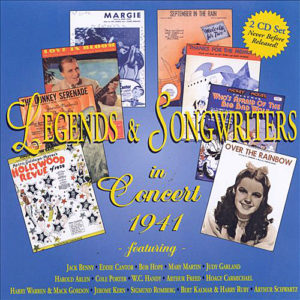 By Steve Crum
By Steve Crum
Deep in my heart the melody lingers, and the song never ends. That is why this marvelous double CD set produced by Brian Gari, Legends and Songwriters in Concert 1941, appeals to me. It will also connect with any lover of the American popular song.
The 45 tracks represent a spectrum of song hits beginning in the teens of the 1900s. As the title suggests, this is a concert–a rarely heard concert even in its time. Taken from what was thought to be lost discs, the Feb. 25, 1941 Greek Relief Fund evening features not only the songs, but the composers. (Many died within a few years of this recording.) Some sing their own creations (always a joy, even when they cannot sustain all the notes), and some accompany other singers via a piano or play solo piano.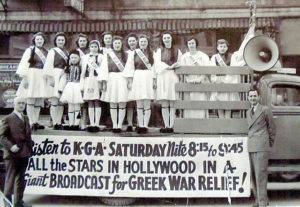
The war in Europe was festering. Pearl Harbor was only months away. So this precious two hours and 20 minutes
recording exists as a history bookmark–an extremely entertaining one. There are patriotic songs (Tony Martin belts out a very mean and stirring “God Bless America” at the conclusion–nearly equaling Kate Smith’s final note); and there are references to the Greek resistance effort against the Axis in a special lyric that Bob Hope sings via “Thanks for the Memory.”
Performed at the Shrine Auditorium in Los Angeles and broadcast on radio only to West Coast listeners, this 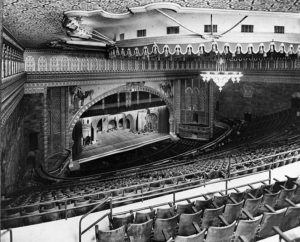 extravaganza includes some of the great entertainers of all time. There is Jack Benny (playing his theme song “Love in Bloom” on the violin–a complete version played straight and gorgeously); a young Judy Garland (singing “Over the Rainbow” with its composer Harold Arlen on piano and David Rose conducting the orchestra–to a thunderous ovation); composer Hoagy Carmichael singing what many still consider the greatest pop song ever written, “Star Dust”; and Eddie Cantor, CD producer Brian Gari’s grandfather, singing his immortal “Makin’ Whoopee” as songsmith Walter Donaldson accompanies him on piano.
extravaganza includes some of the great entertainers of all time. There is Jack Benny (playing his theme song “Love in Bloom” on the violin–a complete version played straight and gorgeously); a young Judy Garland (singing “Over the Rainbow” with its composer Harold Arlen on piano and David Rose conducting the orchestra–to a thunderous ovation); composer Hoagy Carmichael singing what many still consider the greatest pop song ever written, “Star Dust”; and Eddie Cantor, CD producer Brian Gari’s grandfather, singing his immortal “Makin’ Whoopee” as songsmith Walter Donaldson accompanies him on piano.
This is one honey of a CD set. The live performance includes numerous fluffs, including Dinah Shore having to restart “South American Way” several times, and Bob Hope coming back for curtain calls twice, even though he is told on air that the show is running late. Sound quality is monaural, no surprise, and there are a few clicks and scratches due to the condition of the original discs. But such imperfections are minor.
On with the plus factors:
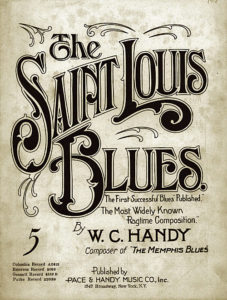 *”St. Louis Blues”–performed by the composer, W.C. Handy, on trumpet.
*”St. Louis Blues”–performed by the composer, W.C. Handy, on trumpet.
*”Smoke Gets in Your Eyes”–Jerome Kern plays the piano, backed by full orchestra. (The orchestra, conducted by either David Rose or Alfred Newman, assists most of the artists.)
*”Lover, Come Back to Me”–played by Sigmund Romberg, the composer, along with a medley of his hits.
*”Indian Love Call”–Rudolf Friml on piano.
*”You Made Me Love You”–played and sung by its soulful and warbly-voiced creator, Jimmy Monaco. 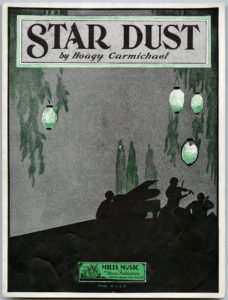
*”My Heart Belongs to Daddy”–Mary Martin sings her signature song with writer Cole Porter on piano.
*”My Buddy”–Remember the wonderful Frances Langford? She sings a wrenching version as composer Walter
Donaldson accompanies.
Perhaps the surprise of the show opens the program. Albert Von Tilzer might be a forgotten song writer, but he sings his own all-time hit that will always be remembered: “Take Me Out to the Ballgame.” Wait until you hear its seldom sung verse.
Pardon me as I listen again.
=====
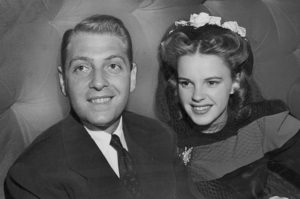 Epilogue: At the time of this concert, David Rose was married to Martha Raye. They divorced on May 19, 1941. Two months later, July 28, he married Judy Garland. They divorced in 1944. This was the first of five marriages for Garland.
Epilogue: At the time of this concert, David Rose was married to Martha Raye. They divorced on May 19, 1941. Two months later, July 28, he married Judy Garland. They divorced in 1944. This was the first of five marriages for Garland.
